Hong Kong’s new national security regime is efficient, if nothing else. Everyone breathed a sigh of relief last year when they saw the new National Security Law’s Article 39.
This says the law is not retroactive, meaning political sins committed before June 30, 2020, when the law was promulgated, would not be treated as illegal acts to be prosecuted and punished afterwards.
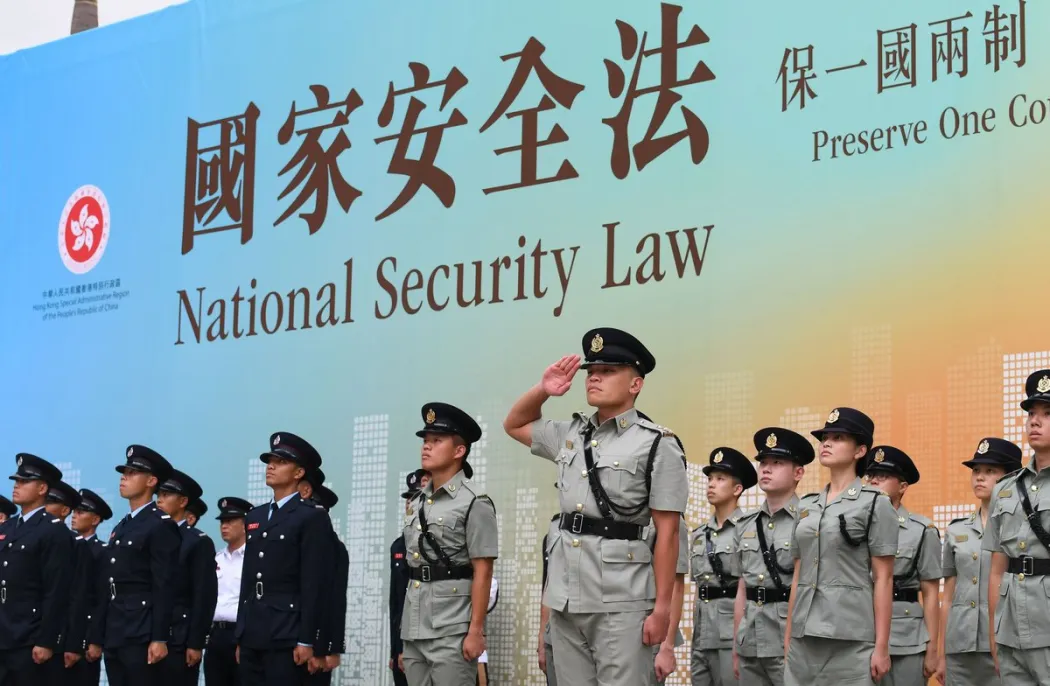
Officials also sought to reassure an alarmed public. They said that only a “very few” individuals would be targeted under the new law. One of these officials was Zhang Xiaoming, deputy director of the central government’s Hong Kong and Macau Affairs Office.
Relief was short-lived. The new rules may not be retroactive in law, but they are being projected backward and forward in time — across the June 30 dividing line — to target acts committed before, as an indicator of intent at the time the act was committed, and therefore of likely behaviour for all time to come.
Following from this unusual interpretation, it has taken just one year to roll up Hong Kong’s entire democracy movement and make it a fast-receding memory. Into the dustbin of history goes the language used in revolutionary days gone by — as well as here and now.
Candidates and councils
First targets were all the movement’s top tier candidates, who had been expecting a big win in the September 2020 Legislative Council election. They had committed various transgressions before June 30, not illegal when they committed them, and in some cases had even promised not to do it again. But the vetting officers chose not to believe the promises, on the grounds they were not sincere.
The election itself was then postponed, officially due to the flu pandemic. Beijing drafters used the time to overhaul Hong Kong’s entire electoral system. The revamp was promulgated in March this year.
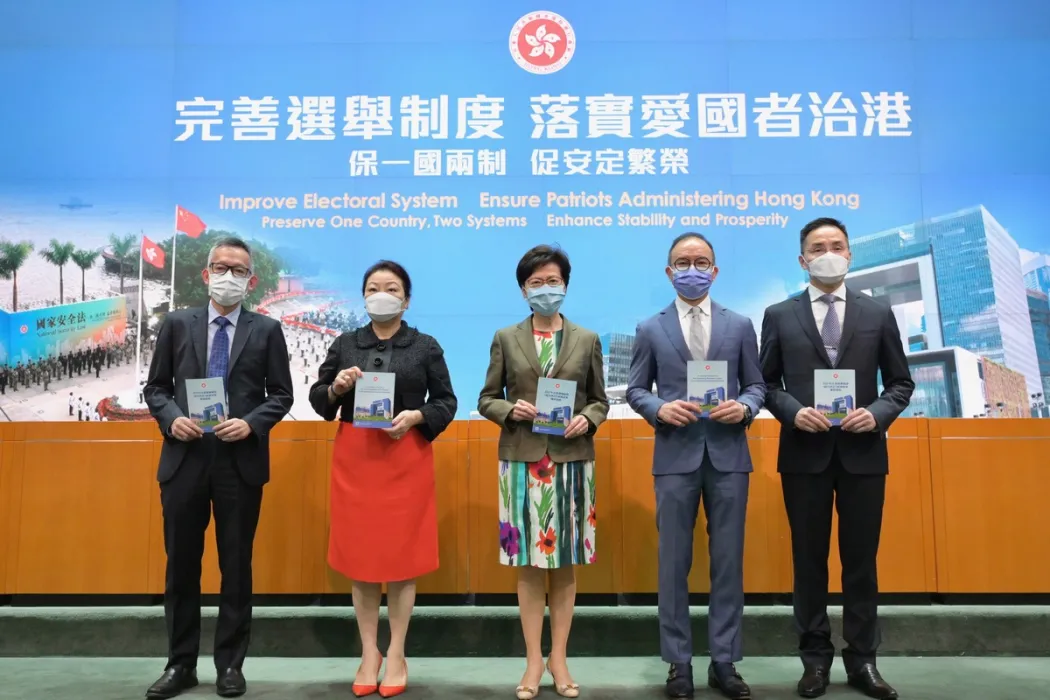
Boundaries have been redrawn, and new rules issued, all designed to eliminate the sectors and constituencies that had served pro-democracy candidates to greatest advantage. The aim is to replace them with what Beijing officials call patriots: pro-Beijing, pro-government loyalists.
A new oath-taking requirement was passed by Hong Kong’s legislature in May. The legislature itself is now virtually devoid of pro-democracy representation. Late last year, a few legislators were summarily disqualified for actions committed before June 30. All but two of their remaining colleagues resigned in protest. As a result, the new oath-taking bill was passed by pro-government legislators alone.
One of the remaining two has just been expelled for past conduct unbecoming to the new standards, even though his behaviour has been exemplary since they were imposed. Among the considerations, apparently, was a perceived need to formally disqualify him.
That done, he is now banned from contesting a Legislative Council election for five years, which means, in effect, two election cycles. The new plans are meant for the long haul.
The pro-democracy caucus in the council had routinely received a majority of the votes cast for its directly elected seats since a version of election by universal suffrage was introduced in the 1990s, shortly before Hong Kong’s 1997 transfer from British to Chinese rule.

The new loyalty-oath law was not just future oriented, however. It listed all the behaviour that was deemed to be a violation of the new post-June 30, 2020 rules. And such acts just happened to be those committed by virtually all the new-wave District Councillors who had been swept into office by the November 2019 election.
Pro-democracy candidates of all groups and factions — including both localists and pan-democrats — had finally come together in a unified coalition for that election. They had also proclaimed their uncritical support for the 2019 anti-government protesters’ demands. These were protest-related, plus the long-standing quest for genuine universal suffrage, elections.
At 71 per cent of all registered voters, not only were their numbers unprecedented but so was the turnout on election day, and so was the result. Pro-democracy candidates won majorities on all but one of Hong Kong’s 18 District Councils. The councils currently have 479 seats, of which 452 were directly contested in 2019, with pro-democracy candidates winning just over 380 seats.
Voters had turned out in strength to endorse candidates who had themselves endorsed the 2019 anti-government protests — violence and all. One of the most disruptive episodes, at the Polytechnic University, was still underway on election day in November.
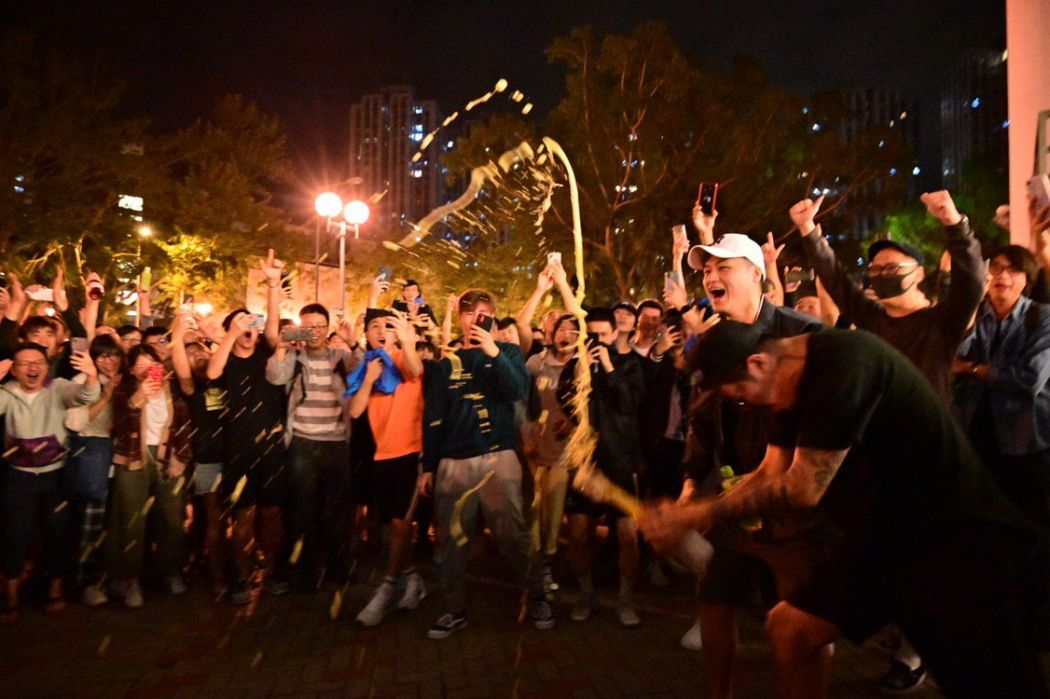
Yet despite the Hong Kong public’s traditional aversion to political violence, voters chose not to punish the perpetrators but to reward them. The message was clear. Beijing was facing, in effect, an emphatic popular rejection of its rule — a message sent not just from the streets but via the ballot box as well.
The issue that had sparked the protests, in June 2019, was the Hong Kong government’s attempt to force passage of an extradition bill through the Legislative Council. The bill would have allowed criminal suspects to be returned to China for trial.
Then, with the new oath-taking law incorporating standards derived from the new National Security Law — and designating past acts as indelible markers of present and future conduct — the authorities announced that everyone would be required to take the new oath. Everyone would include civil servants, the remaining Legislative Councillors, and the District Councillors.
The authorities also let it be known that not only were large numbers of District Councilors likely to be disqualified and unseated for having earlier violated the terms of the new loyalty oath they were about to take.
Additionally, they might also be required to return the salaries and expenses they had received since assuming office in January 2020. The threat would have included the return of large sums that had already been spent on running district offices and hiring people to staff them. Bankruptcy loomed for many.

The tactic worked, boasted an unnamed official to the South China Morning Post in mid-July, as the “class of 2019” began a rush for the exits. As of now, the number of vacated seats is reportedly around 200, or over half the total number of the “dissident class” elected in November 2019.
Meanwhile, the government seems to have decided that the oath-taking ceremony is not a matter of upmost urgency after all and can be put on hold – for now. The date for this event has yet to be announced.
Thus, the decks have been cleared in preparation for Hong Kong’s new-style election season, to begin later this month. The pro-democracy candidates who were threatening to take over the Legislative Council have been removed from the scene. So, too, have the incumbent pro-democracy legislators and a large number of their district-level counterparts. With past, present, and future now all tidied up, the new era can safely begin. But there was more to come.
Civil society
All the principal players have been effectively dispatched. Those not touched by the institutional overhaul are either currently in jail on various charges or have fled overseas to escape the same fate. Remaining more or less intact, however, were the popular underpinnings of the movement that had kept issues and memories alive from one decade to the next, regardless of the setbacks along the way.
Hence, the demolition of Hong Kong’s democracy movement could not be complete until its foundations had been destroyed as well. This phase, currently underway, has been a summertime project. It escalated with the final assault in June that brought down Apple Daily, the movement’s defiant media champion since 1995.
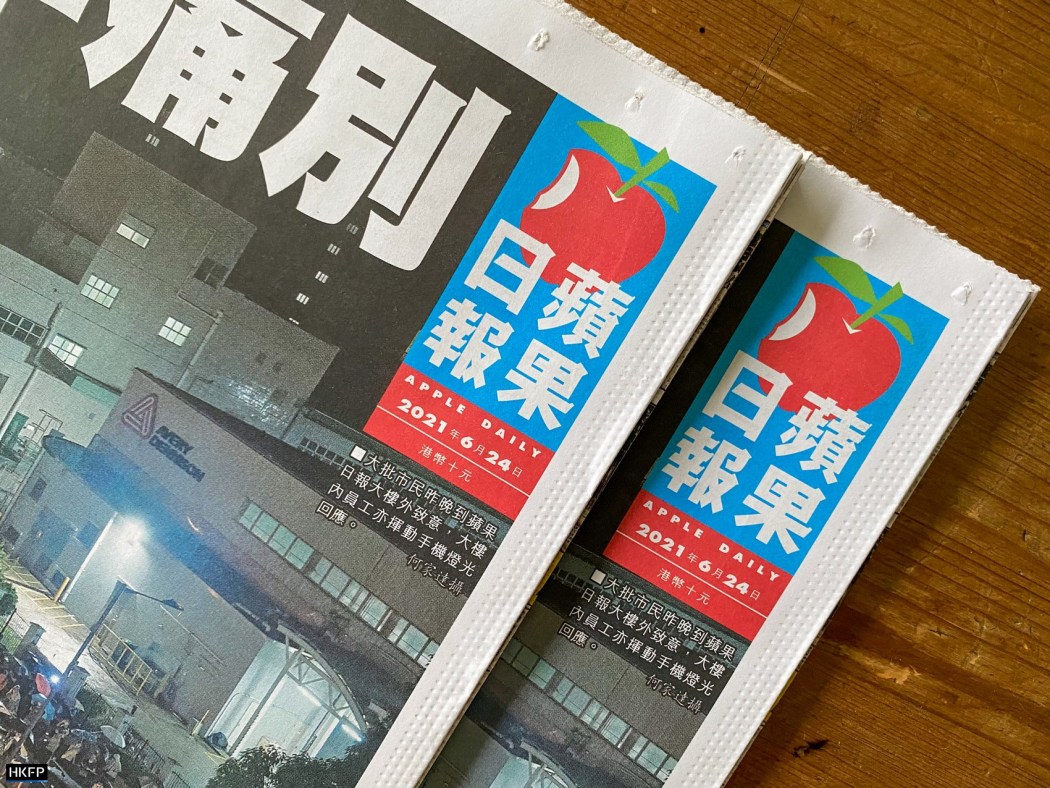
Daily bombardments from state-sponsored news outlets and government officials are targeting the main civic organisations that had grown up with the democracy movement from its inception in the mid-1980s. The campaigns began then as they are ending now — with the still unfulfilled demand for Western-style universal suffrage elections.
But beyond the political rationale, this final demolition phase entails the targeting and collapse of the main civil society organisations that underpinned and reinforced the movement’s political aspirations.
In the direct line of fire all summer have been the Professional Teachers Union, with 95,000 members; the Hong Kong Alliance in Support of Patriotic Democratic Movements in China; and the Civil Human Rights Front, which had over 40 affiliated groups before the exodus began. These three civic organisations are now in the process of dissolution, as are several other smaller activist groups and professional unions.
Also currently being targeted is the Hong Kong Confederation of Trade Unions, which claims affiliated union membership of 160,000. The fate of the CTU has yet to be announced.
Teachers’ union
Oldest of the organisations was the teachers union, founded in 1973 to promote the interests of professional or certified schoolteachers. The founding president was the late Szeto Wah, who enjoyed something less than an amicable relationship with the authorities.
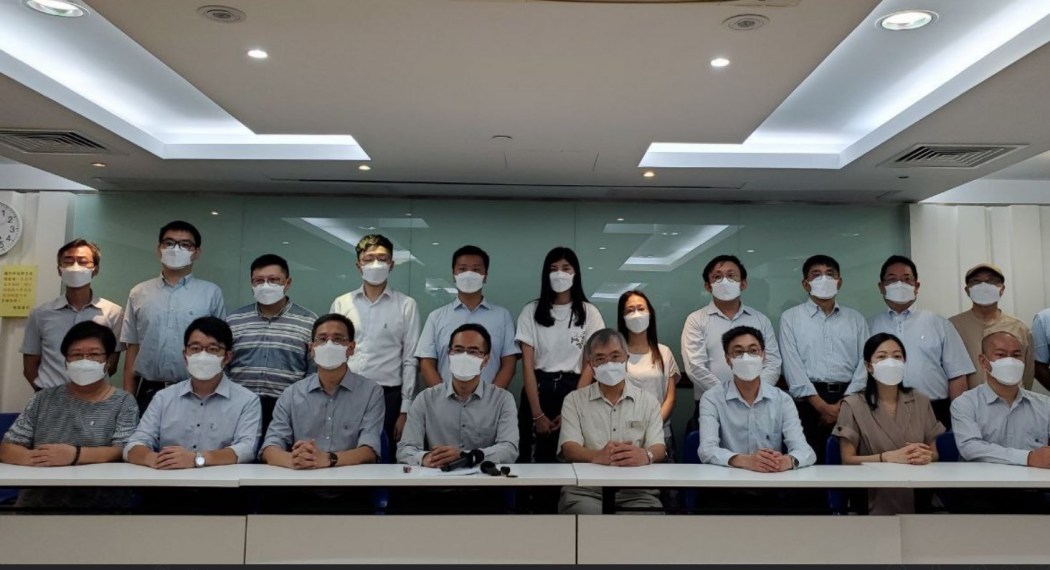
In those days, the British regarded him as a pro-communist troublemaker, but his was a family of divided political loyalties and Szeto himself went on to become one of the founding fathers of Hong Kong’s democracy movement.
Under his leadership, besides promoting the interests of its members, the PTU became one of Hong Kong’s most reliable advocates for democratic political reform. When the colonial government began with baby steps, by introducing indirect representation in Hong Kong’s Legislative Council, Szeto was elected to represent the new education sector.
Lawyer Martin Lee Chu-ming was the popular choice of the new legal sector, and so Hong Kong’s introduction to electoral politics began, in the mid-1980s.
The two men became determined advocates of universal suffrage or direct elections to replace the indirect “small circle” sectoral variety. The first direct popular votes were not cast until 1991 — for a few seats in the otherwise appointed colonial council.
The goal of a wholly elected legislature was never realised but the legacy of their early work continued throughout the next three decades. PTU teachers were able to ensure that the education sector was always represented by a democrat. The legal sector remained firmly in democratic hands as well.
Political organising took the form of a multiplicity of small political interest groups, that joined to form the United Democrats, predecessor of the Democratic Party. But back at the beginning, the two men, Szeto and Lee, hit upon something like a division of labour. Martin Lee became founding chairman of the Democratic Party in 1994, while Szeto applied his organising skills to another new project.
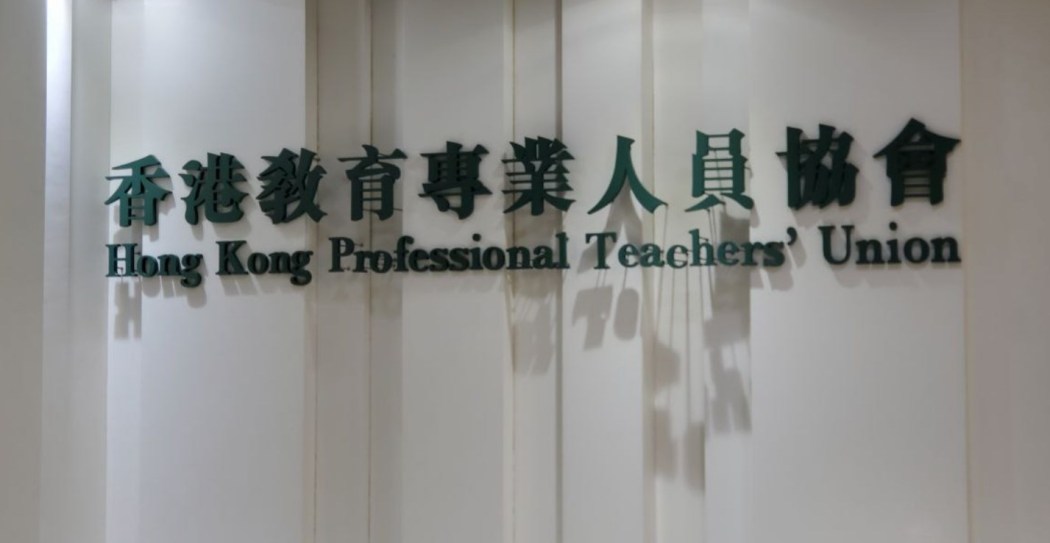
They were the only “liberals” or pro-democracy representatives on the committee that Beijing consulted while drafting the Basic Law. This was promulgated in 1990, to serve as Hong Kong’s post-1997 constitution. Both resigned in protest after June 4, 1989, when the central government ordered the People’s Liberation Army to clear protesters from Beijing’s Tiananmen Square by force of arms.
Hong Kong Alliance
Hong Kong’s first truly massive political street protests took place at that time, in 1989, as people already worried about Beijing’s plans to resume sovereignty over Hong Kong in 1997 saw their own future written in the fate of those occupying Tiananmen Square. A new organisation was formed to represent that fear.
Szeto Wah became founder of the Hong Kong Alliance in Support of Patriotic Democratic Movements of China. This was the group that organised the June Fourth candlelight vigils, held in Victoria Park each year afterwards, to commemorate the events of 1989.
Until 2020, thousands went to the park every year to exercise Hong Kong’s right to remember the past, mindful that such events were banned everywhere else in China. The vigil was officially not allowed that year, due to the coronavirus pandemic. But plans for the new National Security Law had just been announced and everyone had immediately grasped its implications.
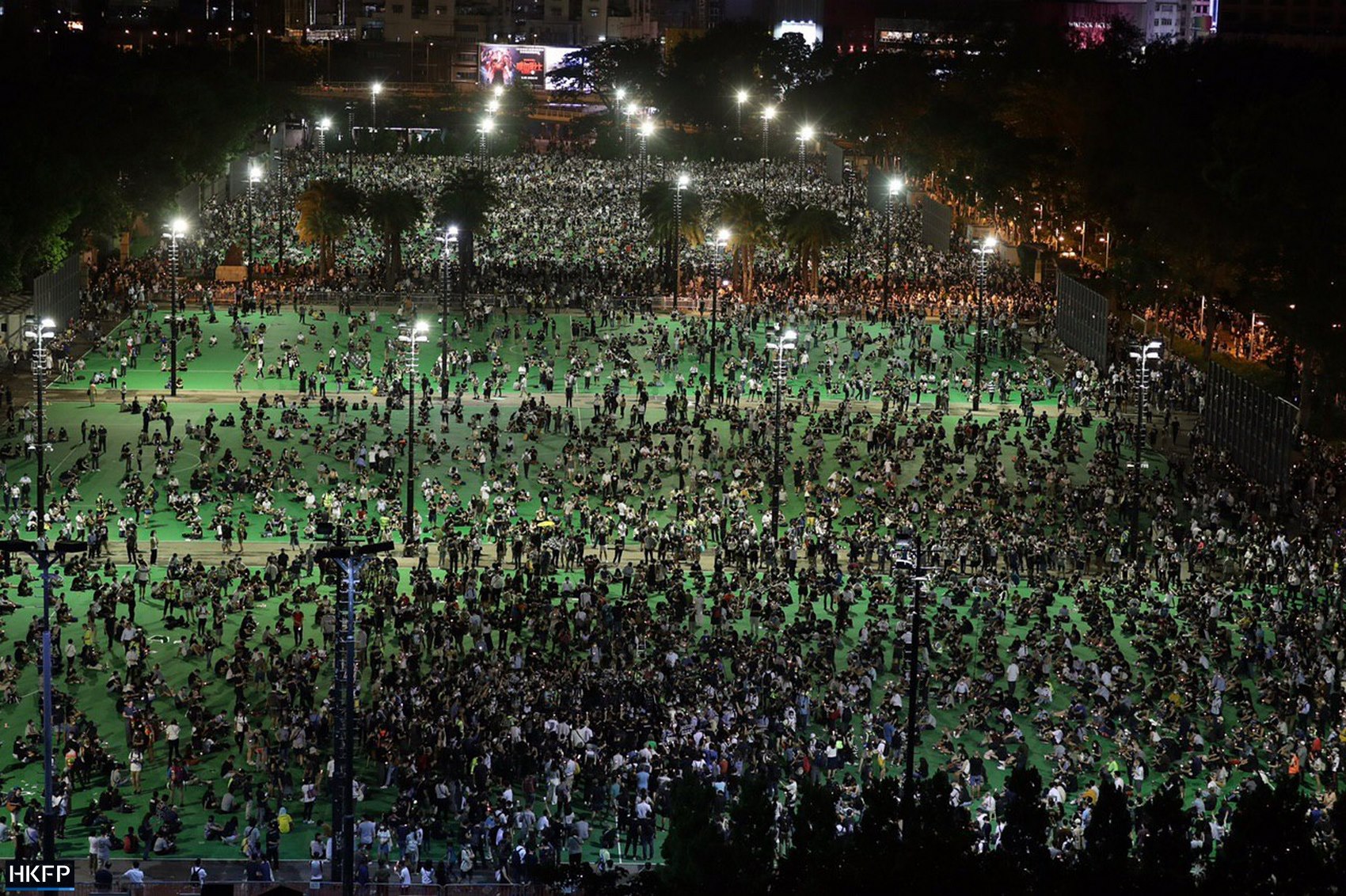
The park entrances nevertheless remained open and the police stood back. Thousands again converged on the soccer pitches to light their candles, this time in silence, without the ceremonial June 4 remembrance routine that Szeto had conducted each year until his death in 2011. Among the event’s most enduring memories was a key defiant slogan: “end one-party rule.”
This year, 2021, police cordoned off the park. No one could enter. So people improvised. They came out onto the streets in the same key shopping districts that had become protest zones in 2019, and lit candles on their own at the usual time: June 4, 8:00 p.m.
Protest coalition
Another of the democracy movement’s most enduring features, however, was factionalism: a multiplicity of small groups all competing with each other for the same limited political space.
But there was one organisation that managed to overcome this endemic weakness, even if for only one day and one demonstration each year — although the number of its sponsored marches and rallies multiplied in recent years.
Activists launched the Civil Human Rights Front in 2002, hoping to revive something of the pre-1997 political interest and energy that disappeared almost entirely during the immediate post-1997 years. The Front presided over the unexpected revival — as organiser of the massive July 1, 2003 protest march and victory celebration afterwards.

All was peaceful and well-organized despite widespread public anger over the government’s failed attempt to force passage of a national security law, as mandated by Article 23 of the Basic Law.
Leadership of the Front then rotated from year to year. But the cumulative experience and discipline was passed on from one convener to the next. The usual factional difficulties set in immediately, compounded by the diversity of political parties and special interest groups that wanted to participate.
The political parties were always worried about the next election and building their voter bases. Many were rooted in Christian congregations and church groups — creating a major contradiction, for example, with gay rights groups.
So, the front laid down some rules. Political parties were welcome to participate and set up fund-raising stalls along the march route on demonstration days. But they could not be part of the organising team. And after due debate among all concerned, everyone had to agree to accept the agreed-upon lead themes and slogans, or not participate.
No march was held that had not received police permission. Violence was not allowed, and kerb-side stall participants had to dismantle whatever props they brought with them as the last contingents passed by. Often the Falun Gong marching band brought up the rear, also allowed despite much controversy due to its being banned elsewhere in China as an “evil cult.”

These rules held from one year to the next — until 2019, which marked the beginning of the end of all Hong Kong’s protest seasons. But even then, the marches were always organised in the same way. It was just what began happening afterwards that transformed them into something else — beginning with the trashing of the Legislative Council’s main chamber after the July 1, 2019 march.
End of days
The charges being levelled against these organisations define the new rules and the kind of political environment Beijing aims to create here. The message is not a reassuring one, at least not for Hong Kong’s voting majority, who have consistently opted for the movement’s causes and candidates despite their many failings.
The kindest thing now being said about the Professional Teachers Union came from long-time loyalist Maria Tam. Commenting on the members’ vote to dissolve the organisation in August, she told TV audiences that educators should confine themselves to educational matters and leave politics to others.
In late July, the Chinese government’s two main media sources — the Xinhua news agency and People’s Daily — had published commentaries denouncing the PTU as a political organisation. It was likened to a dangerous tumour that must be exposed, and excised. The Hong Kong government immediately severed ties with the union, announcing that officials would no longer consult and cooperate on matters of mutual concern.
Simultaneously the pro-Beijing media here launched into a full-scale campaign-style tirade against the union. The language is rhetorical overkill with Hong Kong being led through a simulated version of the old-style revolutionary struggle sessions that rose and fell intermittently during the first three decades of Communist Party rule after 1949.

A key charge, as spelled out by the local Wen Wei Po daily on August 9, was that the union had come out in support of Benny Tai’s July 2020 primary election that allegedly aimed to overthrow the Hong Kong government.
The candidates in that informal straw-poll exercise featured in the mass arrests conducted in January this year. Most have not been granted bail and remain in custody pending trial on national security charges.
Tai is characterized as one of the “three clowns” who launched the 2014 Occupy-Umbrella Movement. Among his many transgressions, Tai visited Taiwan in March 2018. While there, he gave a talk lauding independence struggles. The PTU must therefore be “exposed and denounced” for coming out in support of his July 2020 primary election event.
The Hong Kong Alliance in Support of Patriotic Democratic Movements of China naturally could not survive in such a climate. But hastening it on its way created something of a dilemma for the pro-Beijing media here because what happened in Tiananmen Square on July 4, 1989, cannot be mentioned in the mainland press.
Local law enforcement, bolstered by its new national security unit, nevertheless knew what had to be done. In early June, police visited a small June 4 memorial museum sponsored by the Alliance. The exhibition of photographs and artefacts has been a constant source of controversy over the years as it was hounded out of one site after another.
This year police said the exhibition was operating without the necessary entertainment licence. Rather than embark on another long legal battle, members decided to leave the venue closed and reopen online via a server located outside Hong Kong.

When quizzed about the offending “end one-party rule” slogan, Hong Kong’s Chief Executive Carrie Lam refused to give a clear answer as to whether or not it is now illegal. She said use of the slogan would depend on the circumstances and evidence gathered in light of the National Security Law.
She also refused to say why the vigil had again been banned this year on health grounds, when other events are now being allowed to resume.
Director Luo Huining, of Beijing’s Hong Kong Liaison Office here, was not so reticent. During a June 12 speech, he said those who called for an end to one-party rule were the “real enemies” of Hong Kong.
Nor was mainland source Lau Siu-kai shy about speaking his mind. He said Beijing now sees the Alliance as an organisation that has colluded with foreigners to subvert the Chinee government. According to a South China Morning Post June 13 account, Lau said it is just a matter of time before the authorities take action against the organisation.
Groups had already begun withdrawing from the Alliance last spring and by mid-August the remaining core members had made the decision to disband.

Both the current Alliance chairman Lee Cheuk-yan and its vice-chair Albert Ho Chun-yan are serving prison sentences stemming from the 2019 protests. Vice-chairwoman Chow Hang-tung has been in and out of jail. The charges relate to alleged incitement of illegal assembly over June 4 commemorations.
As for the Hong Kong Civil Human Rights Front, Beijing sources were already heralding the demise months before it actually happened. Global Times reported on March 15 that the Front was disbanding amid a probe into its sources of funding.
These have long been an issue because the Front has always failed to register, as it should, under Hong Kong’s Societies Ordinance. Their reasoning, said leaders years ago, had to do with the cross-border business interests of many of its contributors and supporters, who would likely suffer the consequences if mainland authorities were to learn about such political affiliations. The impact on Apple Daily’s advertising revenues was cited as a case in point.
This old accusation against the Front has now been redrafted in terms of the new National Security Law and is far more serious. The Front has allegedly violated the law by accepting grants from the National Endowment for Democracy in the United States. If confirmed, proclaimed the Global Times triumphantly, the Front will be banned.
Further, according to this new narrative, the Front was an anti-government organisation masquerading as a civil society platform claiming to exercise its right of free expression. In reality, it was used as a political tool by anti-government forces that had as many as 60 affiliated groups at its peak.
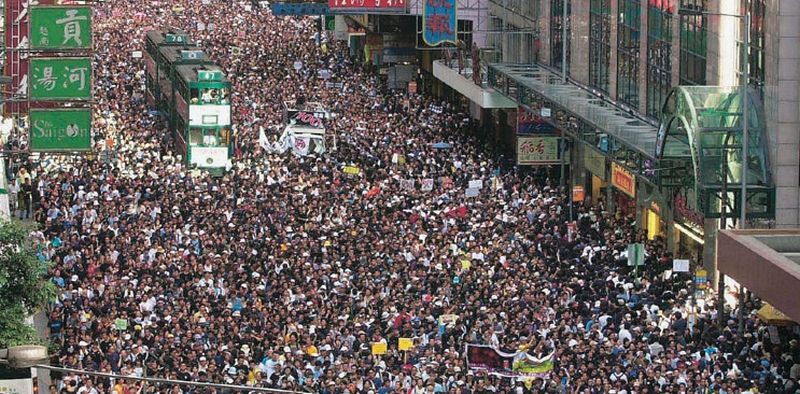
According to this charge sheet, the Front was responsible for everything. It had begun by mobilising opposition to the Article 23 national security legislation in 2003, and then led marches every year attacking Hong Kong’s “one-country, two-systems” governing formula.
It didn’t reflect public opinion but instigated and provoked it with universal suffrage and anti- Beijing rhetoric, according to authorities. The Front is blamed for Joshua Wong’s campaign against the proposed national education curriculum in 2012. Then the Front threw its weight behind Benny Tai’s Occupy Central campaign in 2014.
Finally, the Front was responsible for the massive July 1, 2019 demonstration against the government’s anti-extradition bill, which culminated in the assault on the Legislative Council building and launched Hong Kong’s season of riotous destruction.
“Good riddance,” declared officials at news of the Front’s August 15 decision to disband. But it’s not over yet, they warned. The Front can run but it cannot hide. Its leaders should not think they can escape the prosecution and punishment they deserve by disbanding an organisation with such a history.
Support HKFP | Policies & Ethics | Error/typo? | Contact Us | Newsletter | Transparency & Annual Report | Apps
Help safeguard press freedom & keep HKFP free for all readers by supporting our team
| HKFP is an impartial platform & does not necessarily share the views of opinion writers or advertisers. HKFP presents a diversity of views & regularly invites figures across the political spectrum to write for us. Press freedom is guaranteed under the Basic Law, security law, Bill of Rights and Chinese constitution. Opinion pieces aim to point out errors or defects in the government, law or policies, or aim to suggest ideas or alterations via legal means without an intention of hatred, discontent or hostility against the authorities or other communities. |

More HKFP OPINION:
HKFP has an impartial stance, transparent funding, and balanced coverage guided by an Ethics Code and Corrections Policy.
Support press freedom & help us surpass 1,000 monthly Patrons: 100% independent, governed by an ethics code & not-for-profit.










